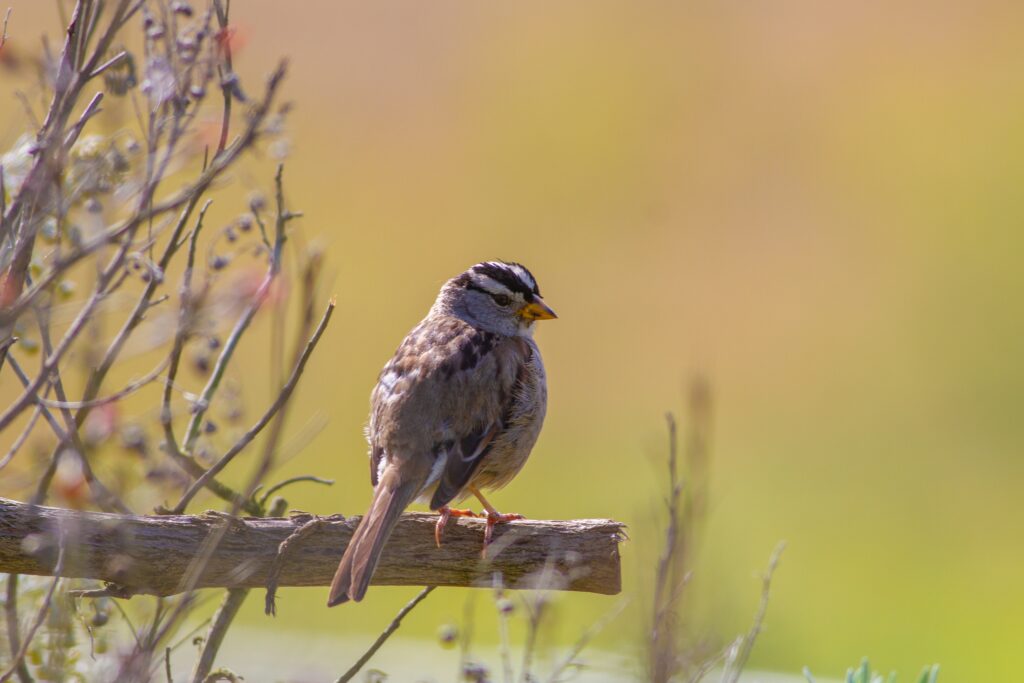
The Impact of Neonicotinoids on Songbird Migrations
By Elizabeth Nguyen
Imagine if humans were knowingly poisoning native plants and animals with neurotoxins similar to nicotine. Well, the widespread use of neonicotinoid pesticides are neurotoxic chemicals poisoning many insect and bird species in our ecosystems. Birds are exposed to these chemicals during migration through the air, water, soil and contaminated seeds they consume. A recent study by Eng et al. (2019) was the first to pinpoint the effects of imidacloprid on migrating white-crowned sparrows in their natural routines. This is critical because it provides insights on not only individual reactions, but of species wide consequences of pesticide use. The findings indicated that both the individual and overall population of songbirds exposed to field realistic doses of neonicotinoids were less healthy overall than those not exposed.
Previous studies have found adverse impacts on captive bird health by imidacloprid (a neonicotinoid compound) through a sort of intoxication that causes birds to consume less and lose weight. It is unclear why the birds consume less under the influence of imidacloprid besides loss of appetite but other adverse impacts of exposure have also suggested such as nutrient simulation and neurotoxicity.
The study used white-crowned sparrows in their typical migration pattern in order to observe the imidacloprid’s influence on migratory birds rather than captive birds. The wild sparrows were caught and given a single field realistic dose of neonicotinoids. The birds subjected to neonicotinoids were found to have worse health and disrupted migratory patterns. The main cause was lack of fat storage after chemical exposure. Fat storage is essential for migration due to the long distances birds must travel; whenever stopped, they must fuel up heavily for the journey ahead. Birds consuming the heavy dose pesticide were observed to consume 70% less than the control populations. This “anorexic” state induced by imidacloprid is detrimental to the health and food consumption of birds.
The impact of weight loss for the birds has a domino effect on their overall migratory habits. Without proper food storage, the sparrows will be delayed in their migration and will stay too long where they consumed Imidacloprid. On average, the experiment birds stayed 3.5 days longer than the control group due to their “intoxicated” state. This in turn leaves the sparrows more susceptible to predation and adverse weather conditions, both which could decrease their chance of survival. Thanks to innovative research and new tracking techniques, the study documents explicit changes in migration habits through proximity to neonicotinoids.
Despite the delay in departure, the birds remained on their typical migration path. Therefore, the impacts of imidacloprid are on the duration of the migration and not the orientation or route. The team concluded that the birds voluntarily wait to travel until after their intoxication period has subsided. These birds do not fly under the influence (of neurotoxins). These delays and shifts in migratory cycles become not only detrimental to individual birds but also to the longevity of the species. The impact of the delays are compounded as sparrows intake neonicotinoids at multiple stops along their migration route. Over time, the cumulative delay worsens and puts individuals further and further behind typically biological schedules. As the white-crowned sparrows arrive later and off sync with others, they have less access to mates and territory. This in turn leads to less offspring produced and less resources available for the birds’ survivals.
This study by Eng et al. (2019) confirmed and strengthened the findings from previous studies that neonicotinoids such as imidacloprid harmed the health of birds contributing to neurotoxicity and weight loss. It furthers our knowledge on large scale impacts of widespread neonicotinoid use through examining migratory species in their normal patterns and habitats. The emphasis on studying wild birds is critical to understand practical implications on species and is aided by new tracking technology. The pesticides are a detriment to individual health through inducing an intoxicated and anorexic state and to species health through reduced offspring and shifts in their migration routine. Studies like these are increasingly critical as humans balance agricultural production aided by pesticides and the delicate balance of our natural ecosystems.
Elizabeth Nguyen is a Core Pathways Fellow and a senior at Georgetown studying Science, Technology and International Affairs (SFS ’21)